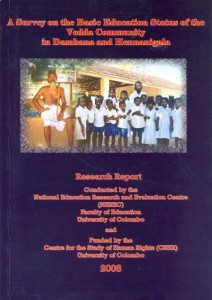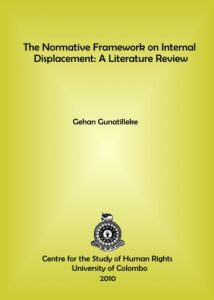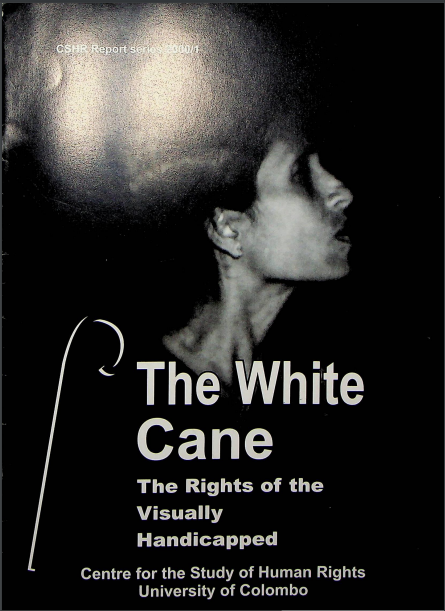CSHR documented the outcome of a workshop on the rights of the visually impaired in collaboration with the Council of Visually Handicapped Graduates (SLCVHG) and sponsored by the Royal Netherlands Government. The research deliberated on right to life, medical care, right to education, educational reforms, university education, right to employment, social mobility, the media, access to public buildings, social security, legal protection, and political rights, in relation to the rights of the visually impaired.
The report recommends the following: to request the government to immediately implement the “Protection of the Rights of the Persons with Disabilities Act” (No 28 of 1996); to make representation to the Ministry of Education to look into the grievances of the visually handicapped teachers; to call for a policy of full employment to the visually handicapped persons; to promote education among visually handicapped persons through appropriate means; to promote the production of text books and teaching materials in Braille; to alert the public and educate them in order that the rights of all handicapped persons will be respected; and to take immediate and appropriate measures to implement all grievances expressed in the report.
CSHR conducted this research in collaboration with the National Education Research and Evaluation Centre (NEREC), Faculty of Education, University of Colombo in 2003. Although many studies have been conducted on the Vedda community, there has been no comprehensive study done at the time with respect to their educational status. This research aimed to outline the historical background, composition, level of education, and factors that have influenced the contemporary status of education of Vedda families, in order to understand whether Vedda community has been deprived of the right to a basic education. The study makes several recommendations to the State to increase the health and education of the Vedda community.

Sophia Elek conducted this research for the CSHR to document the contemporary concerns and needs of women IDPs as they contemplate resettlement, with the intention of assisting those working in the field and the broader population in understanding the ways in which they can work in support of, and together with IDPs to protect their rights; and to advise human rights education to meet the identified needs of IDPs and incorporate their experiences into existing educational programmes.
The broad goals of the research were as follows: to identify the gendered effects of displacement – documenting the primary concerns of women IDPs; to identify social, physical, and structural constraints which hinder women in addressing their concerns; and to determine what support mechanisms exist for IDP women, and the extent to which these services are known and utilized.
Field work was conducted in Anuradhapura, Puttalam, Mannar, Madhu, Mallavi, Kilinochchi, Jaffna, Batticaloa, and Trincomalee Districts. Over 100 semi-structured single and group interviews were conducted in Sinhala and Tamil, with members of the IDP community, camp officials, relief workers, health workers, and I/NGOs in the field.
Locations were selected in an attempt to meet members of all ethnicities in a diversity of settings: long- and short-term WCs, resettlement villages and relocated communities were sought throughout the conflict affected areas of the North and East. While women were the majority of IDP interviewees, men were also interviewed. Where quotes appear referenced to an interview conducted during fieldwork, every attempt was made to retain the original language, context and intent of the interviewee.
The objective of the research was to compile a report on violations and abuse of children’s rights. This research was conducted through extensive field work, obtaining data from institutions involved with the care, support and training of children. The researchers paid particular attention to four main groups: children in children homes; staff of children’s wards in hospitals; staff of Women’s and Children’s Desk in police stations; and staff of Children’s home.
Children were interviewed from many parts of Sri Lanka, including Kiribathgoda, Halawatha, Delgoda, Kandana, Aluthgama, Polonnaruwa, Trincomalee, Kokilai, Gampola, Naranwala, Kalutara, Hambantota, Moneragala, Colombo, Puttalam, Galle, Kegalle, Nuwaraeliya, Mahiyanganaya, Moratuwa, Wellawaya, Ratnapura, Wattala, Matara, Kandy, kanthale, Matale, Pamugama, Panadura, Kurunegala, Anuradhapura, Kataragama, Avissawella, Ampara, Gampaha, and Badulla. Travel restrictions have barred the field work being conducted in conflict-affected areas of the country.
The research extensively deliberates on the responses of children on the following: the right to name and nationality; freedom of thought, conscience and religion; protection of children without families; family status of children; reasons for being orphaned/abandoned; sources from which the children came to the homes; opinion of children about homes in which they are staying; treatment of children by the staff; corporal punishment at children’s homes; discrimination by staff of children’s homes; opportunity available to discuss children’s problems with staff; education and schooling of children in homes; adequate standard of living; involvement of children in maintaining homes; engage in play, leisure, recreational and cultural activities; association with friends; daily routine of children; how children in homes spend their school holidays; sleeping arrangements in homes; disturbances and children’s safety at night; maintaining contact with parents/family; survival and development of children; intention of the children to remain in the homes/leave in future; expression of opinion and being heard; health and health services; children in need of financial assistance; children subjected to harassment; observations on strangers visiting the homes; children with special needs; special training for children with special needs; children on medical treatment; maintaining contact with families; and facilities needed by children with special needs.
Responses from hospital staff of children’s wards include: availability of special wards for children in hospitals; number of child patients entering hospitals; most common types of illnesses for which child patients are treated; facilities pertaining to children’s wards in hospitals; accommodation and numbers of beds; availability of specialists for children’s wards; water and other sanitary facilities; and medical equipment, medicine, staff and other facilities.
Responses from Women and Children’s Desks deliberate on the following aspects: complaints on child exploitation; complaints on sexual exploitation of children; available legislative provisions and legal instruments; complaints on children involved in drugs; available legislative provisions and legal instruments; complaints on street children without parents; complaints of any other nature received on children; sources from which officials receive complaints; dialing the hotline 444444; police investigations; complaints made by the public through the telephone; safeguards taken with regard to complaints on children; time taken to act on complaints; time taken to act on telephone complaints; practical difficulties encountered by officials; and juvenile courts.
Responses from staff of children’s homes entailed: registration of orphanages; status quo of children in homes with regard to their relatives; accommodation of children; number of children accommodated in the homes at the time of the research; age groups to which the children belong; possession of birth certificates by children in homes; homes that had children without any guardians; the status of children’s schooling; children of schooling age who do not attend school; reasons for not attending school; arrangements made by homes with regard to children not attending schools; homes that had vocational training programmes; types of vocational training programmes conducted by schools; special training received by staff members of homes; difficulties faced by staff members; whether staff members enjoy working with children; reasons for enjoying working with children; remuneration received by staff members; problems encountered by staff members while working with children; type of facilities at homes provided for the children; average amount of money spent on a child per month; financial assistance received by the government; opportunities/lack of opportunities available for children in homes; the importance of providing a counseling service for children; security situation of homes; children running away from homes; reasons for children to run away from homes; and letters of criticism received or published in relation to the activities of homes.
This publication provides an overview of the basic requirements of UN Guidelines and Principles specifically in relation to IDPs; examples of situations of IDPs in the global context and the Sri Lankan context; together with lessons learn from the past experience of the tsunami; and the manner in which these principles and guidelines could apply to the IDP situation in Sri Lanka.
UNDP commissioned CSHR to carry out consultations with IDPs due to the urgent need to indemnify their situation in 2010. Existing legal and other documents that were available in relation to IDPs were reviewed to gain an understanding of what was available at the time for IDPs and the gaps in terms of the provision of services. The purpose of conducting this review was to provide assistance in the preparation of a national policy for IDPs in Sri Lanka

This publication shows the evolution of human rights and its impact on the various facets of our lives, how necessary it is for us to reflect on the challenges to human rights and the complex nature of violations, in the areas of education, children, gender, intellectual property and cyber politics. Articles include both field research and desk research.
List of articles: Poverty, education and conflict: a study of selected districts in Sri Lanka; “Beating is for buffaloes” vs “School children’s human rights … a Western madness”: teachers’ attitudes towards and justification for corporal punishment; Children behind bars: an unrevealed version of children’s rights in Sri Lanka; Human rights in criminal law in Sri Lanka in relation to sexual violence against women; Sexual harassment in the workplace: an evaluation of the effectiveness of legal responses available in Sri Lanka; Beyond the length of the handle of a spoon: an outlook of women in the public-private dichotomy in Sri Lanka; The interface of intellectual property law and human rights: international, regional, and Sri Lankan perspectives; and Human rights 2.0: between cyber liberation and militarization.
